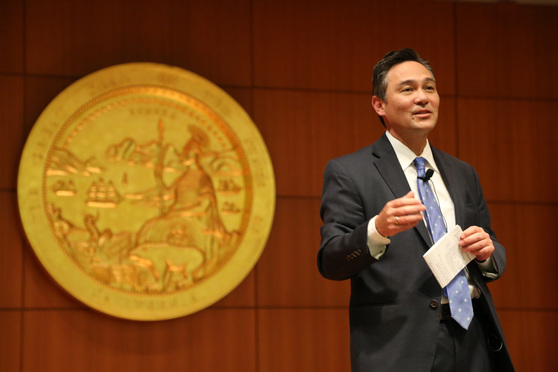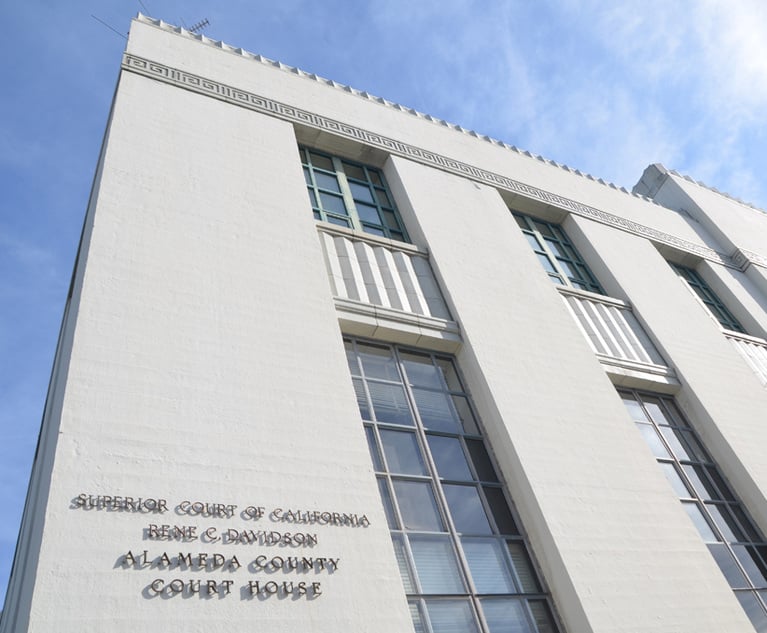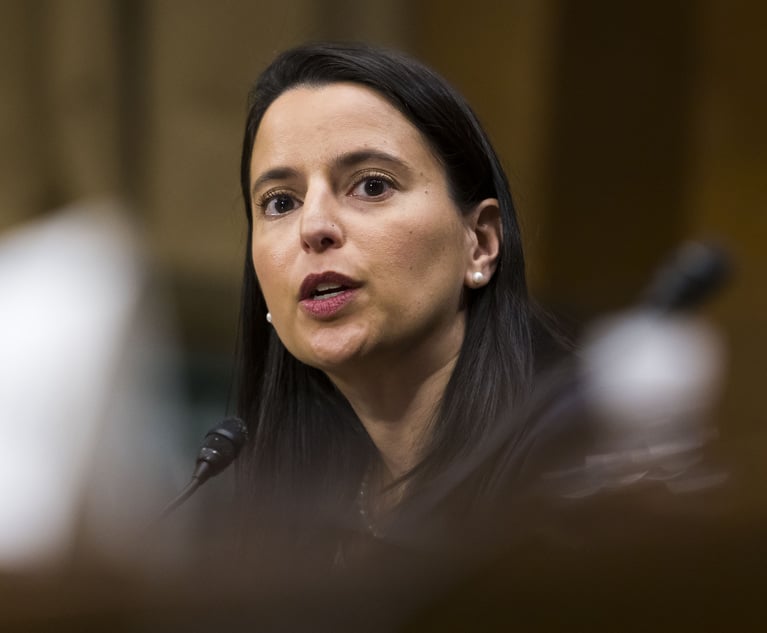'How Do We Exit?' Judicial Council's Leader Ponders Post-Pandemic Court Operations
"Everybody recognizes that everybody's got a role and responsibility to play and that it's all interconnected—we all got a crash course in the zen of how we are all tied together in things," Martin Hoshino, administrative director of the Judicial Council, tells The Recorder in a wide-ranging Q&A.
May 04, 2020 at 08:00 AM
9 minute read
 Martin Hoshino, administrative director of the Judicial Council. Courtesy photo
Martin Hoshino, administrative director of the Judicial Council. Courtesy photo
Since mid-March, California's chief justice has issued 140 emergency orders for courts grappling with the coronavirus pandemic. Now, with the governor and health officers talking about easing stay-at-home restrictions, court leaders are looking at possible paths to reopening.
Martin Hoshino, administrative director of the Judicial Council since 2014, recently spoke with The Recorder about how courts may restart operations, what emergency-inspired changes might endure and what judicial branch leaders are doing to prepare for a recession-battered budget.
Excerpts of the conversation were edited for length and clarity.
The Recorder: You just left a meeting with presiding judges and court executive officers. What are you hearing?
Hoshino: Folks are starting to think about—since the emergency orders are temporary and backlogs are building and there have been work stoppages—how do we exit?
It was a really good discussion. They're starting to think about, "How do we get back online and into business?" Everybody accepts this cannot go on in terms of the stoppage. And there are real needs out there that are unmet.
What is the game plan for reopening courts?
It will be a combination of things. There are a lot of guidelines that will be coming out at both the federal level, from us as well as the courts themselves. But one of the outcomes of this meeting was trying to get the courts talking more and more to each other.
They're going to form a work group to try and identify some of the best practices and so at least there will be a template and a guideline for everybody to generally start to track to. As you would expect, some courts are further along than others. Some of that has been driven by their actual need or what the condition of the virus and the crisis is in their communities.
There will be variation. But the factors that will explain the variation will be court size, community capacities, court resources and then a whole lot of what the public health officers are saying in each community.
What about the status of protective equipment—masks, gloves, cleaning agents? Is that up to each individual court to acquire and provide and to set the rules?
Everybody plays a role in that because again there's a mix of abilities and capacities. And again it goes back to some of the public health guidelines at the county level. Some courts have been able to access different supplies. Some of them are dictated by the discussions they're having with their labor groups.
At the Judicial Council level we collected and already have a storage of our own of N95 masks that were leftover or being held in preparation for the coming wildfire season. There were 1,400 of those and we redistributed them to about 17 courts that asked for them.
I think we've also ordered 80 gallons of hand sanitizer. We don't know when we'll get it because I think everybody's ordered gallons of hand sanitizer. If anybody had asked earlier this year, what do you think you'd be working on in April and May, trying to get hand sanitizer wasn't on my list.
What is the relationship between the Judicial Council administration and the courts? This situation has really shown maybe the benefits and maybe the deficiencies of having a decentralized system of governance.
To be candid with you, when it started there was that ebb and flow and it showed some of the issues with the governance structure in the California judiciary. But in very short time we got past a lot of that and I would say that right now the relationship between the council level and the trial court level is really healthy.
Everybody recognizes that everybody's got a role and responsibility to play and that it's all interconnected—we all got a crash course in the zen of how we are all tied together in things. And it maybe is one of the nice silver linings to a crisis like this.
And yet courts are mandating different things. You've got lawyers who have to go between the courts finding courthouses that are closed and others that have more services. Is that a good way to run court operations?
The variations in the courts, a lot of that is on the margins and it gets most of the attention because it looks like they're way off in their own space. But I would say the bulk is settling in to the look and feel of consistency for the residents of the state.
When it comes to practitioners, it's a little bit different. And we do have a lot of demands. This is one of those times when you're balancing all of these interests. One side says you went too far and the other side says you didn't go far enough. But that is the nature of what we're doing. We're trying to make the best decisions based on the available information. And the difficulty is sometimes the information is scant and the information changes rapidly.
Do you think any of these emergency changes will stick when operations return to whatever normal is?
There are going to be some things that linger as we go through this period of time, however long this is. And then there's going to be the things that just lapse.
And some examples might be e-filing practices just as a regular thing in all courts everywhere. The document drop boxes that have been placed around the state. Video appearances. More forgiving of failure to appear responses and policies. And even video or teleconferencing at a higher level than what was happening before.
Some folks think everything will be done in a digital format. I hope that's not one of the things that last. More and more I think that justice is more than an abstract ideal. It is actually a human democratic experience. And that is also an experience and a feeling. And I hope that that doesn't get lost.
And the disparate nature of court governance isn't one of those things that should change?
I think there's always going to be some level of variation. Everyone uses the phrase "one size can't fit all." I think that's certainly true. But we all have to agree this is a garment. It can come in small, medium and large. It can have a print, it can have polka dots. It can be blue, it can be red. But it is a garment.
So you have this judicial system. There is a realistic expectation of residents that justice will be even in that system. And I think you can get to that evenness but you also have to recognize again there are variations in capacities that exist out there when it comes to the actual administration of the law itself.
Who initiated the executive order the governor gave to the chief justice giving her wide-ranging authority to set statewide court rules?
The governor did that on his own. We were about to go into an emergency Judicial Council meeting and take an action that we thought could create work or policy concerns for the administration. The chief said you got to call over there and make sure they understand what it is we're about to do because we don't want them surprised by it.
And I kept advising them about actions that the council may or may not take, and that it may implicate parts of the executive branch. And then from there they obviously had their own discussion and made their own decision. It happened really kind of quickly.
How bad is the next budget going to be?
I don't have specific knowledge but my gut tells me that it's just going to be grim. I haven't seen the math or the numbers of the dimension. But everything that they're saying suggests that we've got a big multi-year problem and folks have already said that the reserves will not be sufficient, which is incredible.
What are you doing to get ready for this?
What we've been doing is messaging to the trial courts because there are some folks who weren't around 10 years ago when we were grappling with that recession and letting them know, you need to plan for this. Don't wait to hear about it. The governor's January budget proposal, good as it was for us, is not even going to be close to what we see either in May or in August. We've let people know that.
Another problem is (courthouse) construction has shifted to the general fund. It stands to reason that if the state budget is a big problem and it's multi-year, the state would not want to add general fund obligations in the first place and secondly not want to add general fund obligations at a higher interest rate than you would get if you could demonstrate a stronger fiscal footing.
This content has been archived. It is available through our partners, LexisNexis® and Bloomberg Law.
To view this content, please continue to their sites.
Not a Lexis Subscriber?
Subscribe Now
Not a Bloomberg Law Subscriber?
Subscribe Now
NOT FOR REPRINT
© 2025 ALM Global, LLC, All Rights Reserved. Request academic re-use from www.copyright.com. All other uses, submit a request to [email protected]. For more information visit Asset & Logo Licensing.
You Might Like
View All

Fresh lawsuit hits Oregon city at the heart of Supreme Court ruling on homeless encampments
4 minute read
Trending Stories
Who Got The Work
J. Brugh Lower of Gibbons has entered an appearance for industrial equipment supplier Devco Corporation in a pending trademark infringement lawsuit. The suit, accusing the defendant of selling knock-off Graco products, was filed Dec. 18 in New Jersey District Court by Rivkin Radler on behalf of Graco Inc. and Graco Minnesota. The case, assigned to U.S. District Judge Zahid N. Quraishi, is 3:24-cv-11294, Graco Inc. et al v. Devco Corporation.
Who Got The Work
Rebecca Maller-Stein and Kent A. Yalowitz of Arnold & Porter Kaye Scholer have entered their appearances for Hanaco Venture Capital and its executives, Lior Prosor and David Frankel, in a pending securities lawsuit. The action, filed on Dec. 24 in New York Southern District Court by Zell, Aron & Co. on behalf of Goldeneye Advisors, accuses the defendants of negligently and fraudulently managing the plaintiff's $1 million investment. The case, assigned to U.S. District Judge Vernon S. Broderick, is 1:24-cv-09918, Goldeneye Advisors, LLC v. Hanaco Venture Capital, Ltd. et al.
Who Got The Work
Attorneys from A&O Shearman has stepped in as defense counsel for Toronto-Dominion Bank and other defendants in a pending securities class action. The suit, filed Dec. 11 in New York Southern District Court by Bleichmar Fonti & Auld, accuses the defendants of concealing the bank's 'pervasive' deficiencies in regards to its compliance with the Bank Secrecy Act and the quality of its anti-money laundering controls. The case, assigned to U.S. District Judge Arun Subramanian, is 1:24-cv-09445, Gonzalez v. The Toronto-Dominion Bank et al.
Who Got The Work
Crown Castle International, a Pennsylvania company providing shared communications infrastructure, has turned to Luke D. Wolf of Gordon Rees Scully Mansukhani to fend off a pending breach-of-contract lawsuit. The court action, filed Nov. 25 in Michigan Eastern District Court by Hooper Hathaway PC on behalf of The Town Residences LLC, accuses Crown Castle of failing to transfer approximately $30,000 in utility payments from T-Mobile in breach of a roof-top lease and assignment agreement. The case, assigned to U.S. District Judge Susan K. Declercq, is 2:24-cv-13131, The Town Residences LLC v. T-Mobile US, Inc. et al.
Who Got The Work
Wilfred P. Coronato and Daniel M. Schwartz of McCarter & English have stepped in as defense counsel to Electrolux Home Products Inc. in a pending product liability lawsuit. The court action, filed Nov. 26 in New York Eastern District Court by Poulos Lopiccolo PC and Nagel Rice LLP on behalf of David Stern, alleges that the defendant's refrigerators’ drawers and shelving repeatedly break and fall apart within months after purchase. The case, assigned to U.S. District Judge Joan M. Azrack, is 2:24-cv-08204, Stern v. Electrolux Home Products, Inc.
Featured Firms
Law Offices of Gary Martin Hays & Associates, P.C.
(470) 294-1674
Law Offices of Mark E. Salomone
(857) 444-6468
Smith & Hassler
(713) 739-1250







